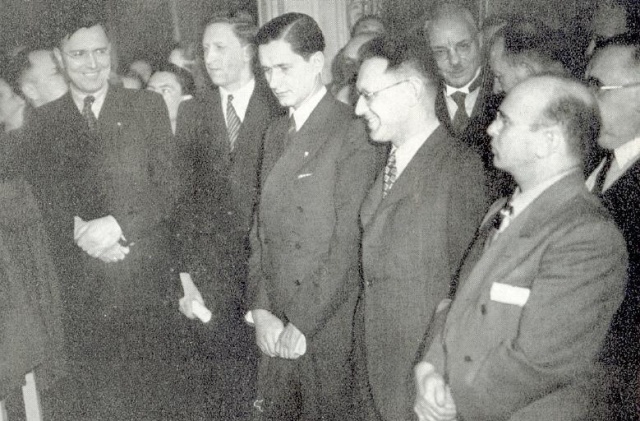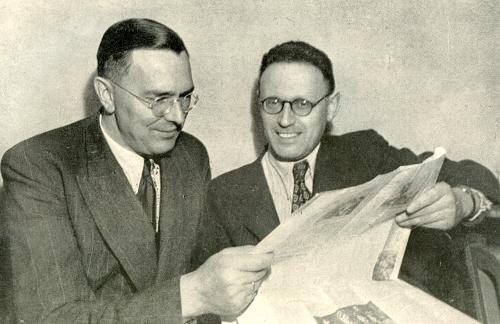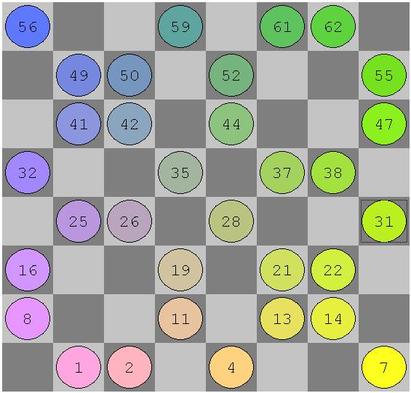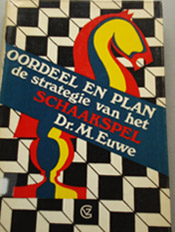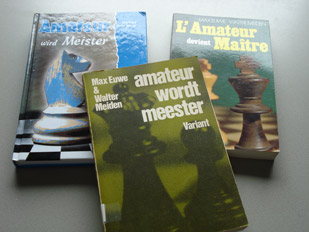Max Euwe

Machgielis (Max) Euwe, (May 20, 1901 – November 26, 1981)
was a Dutch psychologist, mathematician, mathematics teacher, computer scientist and chess Grandmaster, who was the fifth World Chess Champion from 1935 until 1937. He served as third President of the FIDE from 1970 to 1978 [2].
As friend of Adriaan de Groot, Euwe supported him in his cognitive experiments, and actively took part. He also encouraged other AVRO 1938 chess tournament players, such as Alekhine, Fine, Flohr, and Keres to participate as well [3] . During the German Occupation of the Netherlands in World War II, Euwe was director of Van Amerongen, a food trader, and could arrange food transports on behalf of the Dutch resistance in Amsterdam [4].
Contents
Photos
World Chess Championship 1948
Euwe, Smyslov, Keres, Botvinnik, Reshevsky, World Chess Championship 1948 [5]
Euwe and Botvinnik
Max Euwe and Mikhail Botvinnik [6]
Prouhet–Thue–Morse Sequence
In 1929 Euwe wrote a paper about set-theoretic aspects of chess [7] , where he re-discovered the Prouhet–Thue–Morse sequence [8]
01101001100101101001011001101001...
in an application of chess proving infinity of games under one certain rule at that time [9] ...
A chess game ends with a draw if a sequence of moves - with all pieces in exactly the same positions - is played three times successively.
... which did not comprise a repetition of the three same moves [10] . It had always been the intention of the rules that this should not be possible, but the rule that a game is a draw if the same sequence of moves occurs three times in succession was not sufficient, as demonstrated by Euwe, f. i. with following move indices [11] :
0: Nb1-c3 Nb8-c6 Nc3-b1 Nc6-b8 1: Ng1-f3 Ng8-f6 Nf3-g1 Nf6-g8
The Prouhet–Thue–Morse sequence is the sequence t satisfying for all positive integers n.
t[0] = 0 t[2n] = t[n] t[2n+1] = 1 - t[n]
| Prouhet–Thue–Morse Sequence 0x6996966996696996 as Bitboard |
Computer Science
In 1956, Euwe became involved with computers. He joined Remington Rand’s computer department as a scientific advisor. In 1959 he became the director of the Research Center for Automatic Data Processing in the Netherlands. Euwe was appointed professor in Informatics - the forerunner of today’s Computer Science - at the Universities of Rotterdam and Tilburg in 1964. In 1976 he was appointed as professor in Cybernetics at the University of Manternach in Luxembourg. Influenced by the ideas of De Groot, Euwe was also very interested in computer chess and researched on the topic, the simulation of human-like, fallible player in the 60s under the auspices of Euratom agency. In 1980, Euwe was co-founder of the CSVN, the Dutch Computer Chess Federation.
Euratom
An AI-effort in machine translation and on developing a computer chess program in the "human style" was conducted under the auspices of Euratom agency in the 60s in the spirit of its President Étienne Hirsch and a team around Max Euwe, Adriaan de Groot, François Lionnais, Claude Berge and Marcel Barzin [12][13] :
Finally an important international team had been gathered around Max Euwe (former world champion) to work on the problem of the simulation of the play of the failures. One found there the encyclopedist François Lionnais, the mathematician Claude Berge, the logician Barzin, the psychologist De Groot. This team made considerably progress on the problems of the mediums of part, but did not have the possibility of carrying out a program of a complete set.
Euwe vs Chess 3
In 1970 or 1971, Euwe played the game with Chess 3, the program that won the 1st ACM United States Computer Chess Championship. Chess 3 played on a CDC 6600 computer, time control 10 min/game[14] :
[Event "?"] [Site "?"] [Date "1970?"] [Round "?"] [White "Chess 3"] [Black "Max Euwe"] [Result "0-1"] 1.e4 e5 2.Bc4 Nf6 3.Nc3 Nxe4 4.Nxe4 d5 5.Bb5+ c6 6.Bd3 dxe4 7.Bxe4 Bd6 8.d4 exd4 9.Qxd4 O-O 10.Nf3 Qe7 11.Bg5 f6 12.Be3 Na6 13.O-O-O Bc7 14.c4 Be6 15.Bc2 Nb4 16.Bb1 Rad8 17.Qe4 f5 18.Qh4 Qxh4 19.Nxh4 b6 20.b3 f4 21.Bd4 c5 22.Bc3 Nc6 23.Rxd8 Rxd8 24.a3 Re8 25.Bc2 Nd4 26.f3 g5 27.Bxd4 cxd4 28.Nf5 Bxf5 29.Bxf5 Re2 30.Bh3 Re3 31.Kb2 Be5 32.Be6+ Kg7 33.Bd5 Re2+ 34.Kb1 d3 35.Be4 d2 36.Kc2 Re1 37.Kxd2 Rxh1 38.h3 0-1
CSVN
Max Euwe's greeting at the foundation of the CSVN, the Dutch Computer Chess Federation [15] :
Who already thought about computer chess 50 years ago? Nobody of course, because the computer didn't yet exist. However, one already spoke about mechanized chess playing, and experienced positional players were compared to a playing chess machine, players stipulated on strictly logical grounds (that coincided with the nature of the proposition) and thereby no deep calculations or combinations was made.
However, the development in computer chess drove in a different direction! The computer appeared and from the first moment big interest on playing chess arose by this marvellous machines. The programs went however in that direction that the computer did not play as a playing chess machine, as we presented ourselves in that former days, but correctly as an ace in conducting deep calculations in all possible directions, a lot of millions per minute.
For the time of computer chess, much (too much) emphasis was steered on brutal force, brutal strength. Moreover, one tried as much as possible on well-known, attentive patterns in the programs. The combination of calculation and recognition in the long run will play chess, whether it yields to master strength is difficult to predict. It is certain, that raising interest on computer chess will bring us closer to a solution. The solution which the computer either crowns to world champion, recognizes as a strong, but unilaterally developed player. In this respect, the establishment of the computer chess association is very welcome. I wish all members success to study the possibilities of the computer and especially introducing methods which will lead to improvements and "humanization" of the programs.
Max Euwe
Max Euweplein
In Amsterdam is a Max Euweplein [16] [17] [18] (square) (near Leidseplein) in remembrance of Max Euwe - with a large chess board and pieces and statue of Max Euwe. The 'Max Euwe Foundation' located there has a Max Euwe museum and a large collection of chess books. During the WCCC 2007 in Amsterdam some participants visited Max Euweplein. Vincent Diepeveen and Johannes Zwanzger couldn't resist to play a fast game on the large board.
| Max Euwe sculpture [19] | Max Euwe Schaakfestival, Amsterdam 2007 [20], YouTube Video |
Selected Publications
- H.J. den Hertog, Max Euwe (1927). Praktische schaaklessen. III. Van Goor, Gouda.
- H.J. den Hertog, Max Euwe (1928). Praktische schaaklessen. IV. Van Goor, Gouda.
- Max Euwe (1929). Mengentheoretische Betrachtungen über das Schachspiel. Proc. Konin. Akad. Wetenschappen (Amsterdam)
- Max Euwe (1931). De Fundamenten van het Schaakspel. W.P. van Stockum & Zoon, Den Haag.
- Max Euwe (1935). Strategie en Taktiek in het Schaakspel. W.P. van Stockum & zoon n.v., Den Haag.
- Max Euwe, Hans Kmoch (1948). Staunton-Turnier Groningen 1946, from Wernis Schachlade
- Max Euwe (1950). Het Eindspel, No. 5. Stukken tegen Stukken II. 2e druk. G.B. van Goor Zonen Uitgeversmaatschappij B.V., Den Haag, Batavia.
- Max Euwe (1952). Oordeel en plan: het denkproces in het schaken.
- Max Euwe (1953). Judgment and Planning in Chess. McKay Company, New York, N.Y. [24]
- Max Euwe, Walter Meiden (1963). Meester tegen amateur.
- Max Euwe (1970). Feldherrnkunst im Schach. Walter de Gruyter & Co., Berlin.
- Max Euwe (1973). Oordeel en Plan: de strategie van het schaakspel. Van Goor Zonen, Den Haag. ISBN 90-00-01577-4.
- Max Euwe, Hans Kramer (1977). Het middenspel, deel 1-4. Spectrum, Utrecht.
- Max Euwe, Walter Meiden (1977). Chess master vs. chess master.
- Max Euwe (1982). The Logical Approach to Chess. Dover Publications Inc. New York, N.Y. ISBN 0486243532.
- Max Euwe, Walter Meiden (1982). Meester tegen meester, deel 1
- Max Euwe, Walter Meiden (1982). Meester tegen meester, deel 2
- Max Euwe, Walter Meiden (1983). Amateur wordt meester.
- Jan van Reek (1997). Max Euwe - praktische strategie. STES, Margraten. ISBN 90-74827-32-2
- Jan van Reek (1997). Strategisch denken. 64 partijen van Euwe. STES, Margraten. ISBN 90-74827-31-4
- Alexander Münninghoff (2001). Max Euwe - The Biography. New in Chess, ISBN: 90.5691.079.5
Forum Posts
- About Euwe by Tony Warnock, rgc, March 19, 1991
External Links
- Max Euwe from Wikipedia
- Max Euwe Centrum
- Max Euwe Centrum - Max Euwe - Fotogalerij
- Max Euwe Centrum - Nieuwsbrief nummer 74 (pdf) (Dutch)
- Euwe biography by J.J. O'Connor and E.F. Robertson, 2003
- The Mathematics Genealogy Project - Machgielis Euwe
- Cyber Heroes of the past: Max Euwe by Wobbe Vegter, 2007
- The chess games of Max Euwe from chessgames.com
- Remembering Max Euwe (pdf) by Genna Sosonko on the 100th anniversary of Euwe's birth, from ChessCafe.com
- Max Euwe chesstournament, November 13-20, 2011 [25]
- Biography - Max Euwe chesstournament
- Paul van der Sterren on Max Euwe - Max Euwe chesstournament » Paul van der Sterren
- Lectures - Max Euwe chesstournament » Jos Uiterwijk on Euwe
- The Max Euwe Center in peril by Frederic Friedel, ChessBase News, August 13, 2015
- Max Euwe Wereldkampioen Schaken 1935, YouTube Video
References
- ↑ Max Euwe, 26 December 1962, by Harry Pot / Anefo, Dutch National Archives, The Hague, Fotocollectie Algemeen Nederlands Persbureau (ANEFO), 1945-1989, Nummer toegang 2.24.01.05 Bestanddeelnummer 915-8814, Max Euwe from Wikipedia
- ↑ FIDE from Wikipedia
- ↑ Fernand Gobet (2006). Adriaan de Groot: Marriage of two Passions. ICGA Journal, Vol. 29, No. 4, pdf
- ↑ Max Euwe Centrum - Max Euwe's loopbaan
- ↑ Interregnum by Edward Winter
- ↑ Chess Notes 5613. Euwe line in the Winawer Variation, by Edward Winter
- ↑ Max Euwe (1929). Mengentheoretische Betrachtungen über das Schachspiel, Proc. Konin. Akad. Wetenschappen (Amsterdam)
- ↑ Jun Ma and Judy Holdener (2005). When Thue-Morse meets Koch. a remarkable connection between the Thue-Morse sequence and the Koch snowflake, pdf
- ↑ Mathematical Problems - Max Euwe's sequence by Manfred Börgens
- ↑ The EUWE SUITE by Rodney Waschka II, John, E Hawkes Chess Blog, Chess-Theory, chess practice
- ↑ Mathematical Problems - Max Euwe's sequence - Solution by Manfred Börgens
- ↑ Le langage / Intelligence et artifices, by Paul Braffort 2002 (French)
- ↑ Max Euwe (1965). Машина играет в шахматы, Шахматы в СССР № 11, 12, pp. 6–10, 18-20 (in Russian)
- ↑ Max Euwe (1971). Встреча с машиной, Шахматы в СССР № 7, pp. 18–19 (in Russian)
- ↑ Computerschaak pagina 1 (Dutch) Redactie: J. ten Have and Drs. S. Kooi, translation with the help of babelfish
- ↑ Welkom op het Max Euweplein
- ↑ Ma place favorite à Amsterdam by Alain Zanchetta, Hiarcs Forum, April 26, 2009
- ↑ Max Euwe Plein | Facebook by Alain Zanchetta
- ↑ Max Euwe from Wikipedia
- ↑ HPGvideos2007 MEC Schaakfestival Amsterdam 2007 Part 1, Memories of Julia and Herbert Pérez García, feat. Hans Böhm, Jan Nagel, Bessel Kok
- ↑ ICGA Reference Database
- ↑ Max Euwe Centrum - Bibliotheek - Boeken op Auteur
- ↑ Literatur von und über Max Euwe, German National Library
- ↑ Judgment and Planning in Chess, games from Dr. Max Euwe's book Judgment and Planning in Chess. chessgames.com
- ↑ Susan Polgar Chess Daily News and Information: Max Euwe Tournament
